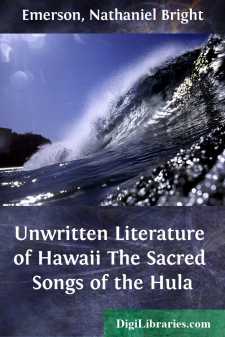Categories
- Antiques & Collectibles 13
- Architecture 36
- Art 48
- Bibles 22
- Biography & Autobiography 813
- Body, Mind & Spirit 142
- Business & Economics 28
- Children's Books 17
- Children's Fiction 14
- Computers 4
- Cooking 94
- Crafts & Hobbies 4
- Drama 346
- Education 46
- Family & Relationships 57
- Fiction 11829
- Games 19
- Gardening 17
- Health & Fitness 34
- History 1377
- House & Home 1
- Humor 147
- Juvenile Fiction 1873
- Juvenile Nonfiction 202
- Language Arts & Disciplines 88
- Law 16
- Literary Collections 686
- Literary Criticism 179
- Mathematics 13
- Medical 41
- Music 40
- Nature 179
- Non-Classifiable 1768
- Performing Arts 7
- Periodicals 1453
- Philosophy 64
- Photography 2
- Poetry 896
- Political Science 203
- Psychology 42
- Reference 154
- Religion 513
- Science 126
- Self-Help 84
- Social Science 81
- Sports & Recreation 34
- Study Aids 3
- Technology & Engineering 59
- Transportation 23
- Travel 463
- True Crime 29
Unwritten Literature of Hawaii The Sacred Songs of the Hula
Categories:
Description:
Excerpt
INTRODUCTION
This book is for the greater part a collection of Hawaiian songs and poetic pieces that have done service from time immemorial as the stock supply of the hula. The descriptive portions have been added, not because the poetical parts could not stand by themselves, but to furnish the proper setting and to answer the questions of those who want to know. Now, the hula stood for very much to the ancient Hawaiian; it was to him in place of our concert-hall and lecture-room, our opera and theater, and thus became one of his chief means of social enjoyment. Besides this, it kept the communal imagination in living touch with the nation's legendary past. The hula had songs proper to itself, but it found a mine of inexhaustible wealth in the epics and wonder-myths that celebrated the doings of the volcano goddess Pele and her compeers. Thus in the cantillations of the old-time hula we find a ready-made anthology that includes every species of composition in the whole range of Hawaiian poetry. This epic of Pele was chiefly a more or less detached series of poems forming a story addressed not to the closet-reader, but to the eye and ear and heart of the assembled chiefs and people; and it was sung. The Hawaiian song, its note of joy par excellence, was the oli; but it must be noted that in every species of Hawaiian poetry, mele--whether epic or eulogy or prayer, sounding through them all we shall find the lyric note.
Footnote 1:It might be termed a handful of lyrics strung on an epic thread.The most telling record of a people's intimate life is the record which it unconsciously makes in its songs. This record which the Hawaiian people have left of themselves is full and specific. When, therefore, we ask what emotions stirred the heart of the old-time Hawaiian as he approached the great themes of life and death, of ambition and jealousy, of sexual passion, of romantic love, of conjugal love, and parental love, what his attitude toward nature and the dread forces of earthquake and storm, and the mysteries of spirit and the hereafter, we shall find our answer in the songs and prayers and recitations of the hula.
The hula, it is true, has been unfortunate in the mode and manner of its introduction to us moderns. An institution of divine, that is, religious, origin, the hula in modern times has wandered so far and fallen so low that foreign and critical esteem has come to associate it with the riotous and passionate ebullitions of Polynesian kings and the amorous posturing of their voluptuaries. We must make a just distinction, however, between the gestures and bodily contortions presented by the men and women, the actors in the hula, and their uttered words. "The voice is Jacob's voice, but the hands are the hands of Esau." In truth, the actors in the hula no longer suit the action to the word. The utterance harks back to the golden age; the gesture is trumped up by the passion of the hour, or dictated by the master of the hula, to whom the real meaning of the old bards is ofttimes a sealed casket....


